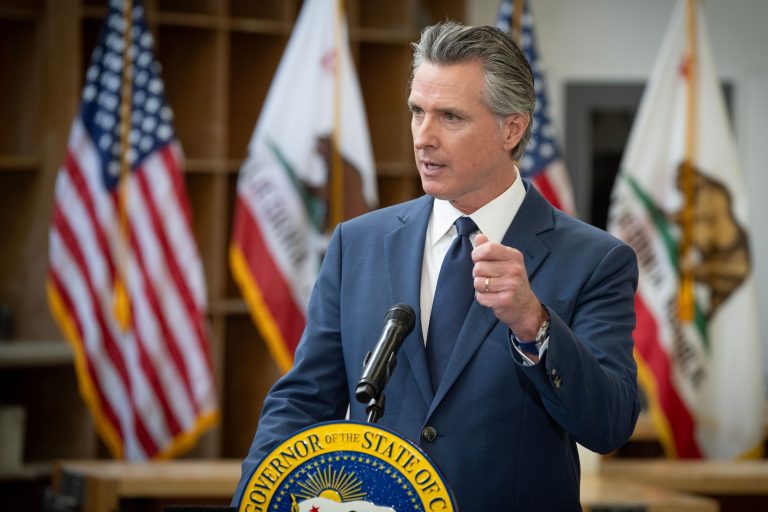
California launched a bold legal challenge against President Donald Trump today, filing a federal lawsuit to halt his sweeping tariff regime, which the state argues is an unlawful power grab that threatens its economy.
The first state to confront Trump’s protectionist trade agenda head-on, California claims the tariffs—imposed under the International Emergency Economic Powers Act (IEEPA)—are illegal, unprecedented, and already wreaking havoc on its farmers, businesses, and families.
As global markets reel and trade tensions fray U.S. alliances, the lawsuit marks a pivotal clash over presidential authority and the future of American trade.
Register for Tekedia Mini-MBA edition 19 (Feb 9 – May 2, 2026).
Register for Tekedia AI in Business Masterclass.
Join Tekedia Capital Syndicate and co-invest in great global startups.
Register for Tekedia AI Lab.
The lawsuit, filed in the U.S. District Court for the Northern District of California, seeks to void Trump’s tariffs, including a 10% levy on all imports and higher duties on China, Mexico, and Canada. Governor Gavin Newsom, a vocal critic of Trump, announced the action on X.
“Donald Trump does not have the authority to unilaterally impose the largest tax hike of our lifetime with his destructive tariffs. We’re taking him to court,” he said.
The suit argues that Trump’s use of the IEEPA, a 1977 law meant for economic emergencies like sanctions, not tariffs—exceeds his powers, violating the Constitution’s assignment of tariff authority to Congress.
Attorney General Rob Bonta, joining Newsom at a 1:30 p.m. ET press conference in the Central Valley, called the tariffs “chaotic and haphazard,” adding, “As the fifth largest economy in the world, California understands global trade policy is not just a game.”
The state contends that the tariffs inflict “immediate and irreparable harm,” threatening its $491 billion import and $183 billion export markets, with over 40% of trade tied to Mexico, Canada, and China. From almond growers to Silicon Valley tech firms, California’s industries face soaring costs and retaliatory barriers, with Newsom’s office estimating billions in damages already.
California’s economy, larger than all but four countries, is uniquely exposed to Trump’s tariffs. The state’s ports handle a third of U.S. imports, and its farmers rely on foreign markets for nuts, fruits, and vegetables. The tariffs, which have driven a $6 trillion S&P 500 plunge since early April, are projected to raise household costs by $3,800 annually, per the Yale Budget Lab, hitting low- and middle-income families hardest. Tech giants like Apple, dependent on Chinese components, and automakers face supply chain chaos, while post-wildfire rebuilding efforts stall due to pricier imported materials like steel and timber.
“Californians are bracing for fallout,” Bonta told NBC News, citing threats to Central Valley farmers, Sacramento small businesses, and “worried families at the kitchen table.”
Newsom has scrambled to shield the state, urging trading partners to exempt California exports from retaliation, but with no deals secured, the lawsuit represents a last stand to protect jobs and growth.
White House Fires Back
The Trump administration hit back hard, framing California’s lawsuit as a distraction from the state’s domestic woes. White House spokesman Kush Desai told CNBC, “Instead of focusing on California’s rampant crime, homelessness, and unaffordability, Gavin Newsom is spending his time trying to block President Trump’s historic efforts to finally address the national emergency of our country’s persistent goods trade deficits.”
Desai defended the tariffs as critical to reviving U.S. industries, vowing the administration would use “every tool at our disposal, from tariffs to negotiations.”
Trump, who declared April 2 “Liberation Day” for American trade, has justified the tariffs under IEEPA by citing trade deficits, $1.2 trillion in goods in 2024, as a national emergency. His executive order imposes a 10% tariff on all imports starting April 5, with higher rates for countries like China (54% total) and non-USMCA goods from Mexico and Canada (25%), effective April 9. The White House argues these measures protect workers and curb reliance on foreign supply chains, pointing to exemptions for steel, semiconductors, and energy to soften domestic blowback.
California’s lawsuit joins a growing wave of legal challenges to Trump’s tariffs, though none carry the state’s economic clout. The Liberty Justice Center, representing small businesses, sued on April 14 in the U.S. Court of International Trade, and the New Civil Liberties Alliance filed a Florida case on April 3, both arguing IEEPA doesn’t authorize tariffs. California’s case, however, leverages the Supreme Court’s “major questions doctrine,” asserting that actions with vast economic impact—like tariffs—require clear Congressional approval, which IEEPA lacks.
Global and Domestic Ripples
Trump’s tariffs have sparked a global trade war, with China imposing 84% duties on U.S. goods and allies like Canada and Mexico mulling retaliation. Over 75 countries are said to be negotiating exemptions, with Japan, South Korea, and the EU securing 90-day reprieves. California, meanwhile, faces isolation as its pleas for exemptions falter, amplifying the urgency of its legal push.
Domestically, the lawsuit reignites Newsom’s feud with Trump, who faced over 120 California suits in his first term.
Newsom said this is about protecting American families from chaos, casting the fight as a defense of national interests. But critics, including Desai, argue it’s political grandstanding, diverting focus from California’s budget deficit and social challenges.
California’s lawsuit could reshape U.S. trade policy and test the limits of executive power. A victory for Newsom and Bonta might unravel Trump’s tariffs, easing economic strain but emboldening other states to challenge federal authority. A loss could cement Trump’s ability to wield IEEPA unchecked, with tariffs becoming a permanent fixture.



